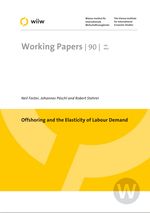Offshoring and the Elasticity of Labour Demand
publication_icon
Neil Foster-McGregor, Johannes Pöschl and Robert Stehrer
wiiw Working Paper No. 90, July 2012
23 pages including 7 Tables and 4 Figures
This paper examines the impact of offshoring on labour elasticities for a sample of 40 countries over the period 1995-2009 using the recently compiled World Input-Output Database (WIOD). Including measures of narrow and broad offshoring, as well as indicators of manufacturing and services offshoring, in conditional and unconditional labour demand equations we find that offshoring has an overall neutral or slightly positive effect on employment. This result hides differences across industry types and across employment types however, with additional results indicating a negative effect of services offshoring in many industry types. Positive effects of other offshoring measures are found in high-tech manufacturing and for high-educated employment in particular.
Keywords: labour demand elasticities, offshoring
JEL classification: F16, J23
Countries covered: non specific
Research Areas: Labour, Migration and Income Distribution, International Trade, Competitiveness and FDI
